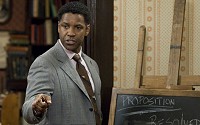
scr Robert Eisele
with Denzel Washington, Forest Whitaker, Nate Parker, Denzel Whitaker, Jurnee Smollett, Jermaine Williams, Kimberly Elise, Gina Ravera, John Heard, Damien Leake, Justice Leak, Robert X Golphin
release US 25.Dec.07
07/US Weinstein 2h03

Take a stand: Washington



“An unjust law
is no law at all.”
St Augustine
 Based on a terrific true story, this film has an important message and knows it. As a director, Washington punches every emotional and thematic point in Eisele's script, which undermines the raw power of the story.
Based on a terrific true story, this film has an important message and knows it. As a director, Washington punches every emotional and thematic point in Eisele's script, which undermines the raw power of the story.
In 1935 Texas, the Wiley College debate team has a spirited coach in Mel Tolson (Washington) who pushes them to be the very best they can be. He encourages them to take on all comers, including the local white-only colleges. His star team is hunky womaniser Henry (Parker), brainy-passionate Samantha (Smollet), the experienced Hamilton (Williams) and 14-year-old James (Denzel Whitaker), whose father (Forest Whitaker) is a local preacher and teacher. But none of them are prepared for the ugliest side of racist society. Even in the all-white halls of Harvard.
These events are profoundly inspiring, so there was no need for the filmmakers to push so hard. Composer James Newton Howard's violins swirl incessantly, reminding us that everything is terribly significant. But rather than focusing our attention on the genuinely powerful moments, this just distracts us. Meanwhile, the script is overly tidy, with thinly drawn characters who are all frightfully heroic with one carefully placed flaw.
At least the cast is good, with an especially strong break-out performance from Parker and a remarkably lively scene between Washington and Forest Whitaker. All of them seize the meaty dialog and run with it, addressing such potent subjects as segregation, injustice, civil disobedience and personal responsibility with wit and intelligence. There are frequent historical touches as well, putting civil rights in meaningful context and even touching on the legacy of racist language.
This subject matter is far too important to be ignored, and Washington fluidly conveys it with style and energy. But even with the hard language of the day, it feels too politically correct. Every impassioned and rousing comment is accompanied by a sentimental preachiness, as if the worthy dialog is spoken in bold italics: "An unjust law is no law at all!" "The time for justice is always now!" And each provocative event is followed by a plot cliche--love triangle, unity through tragedy, fighting the bigger fight. If the filmmakers had just quietly told the real story, this could've been a knock-out.
 |
themes, language, violence, some sexuality | 10.Dec.07 |

 Still waiting for your comments ... don't be shy.
Still waiting for your comments ... don't be shy.
HOME | REVIEWS | NEWS | FESTIVAL | AWARDS | Q&A | ABOUT | TALKBACK